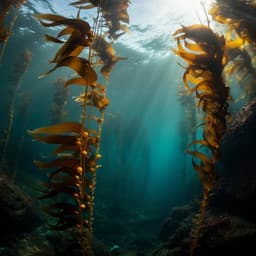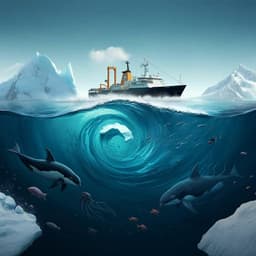
Environmental Studies and Forestry
Marine protected areas do not prevent marine heatwave-induced fish community structure changes in a temperate transition zone
R. M. Freedman, J. A. Brown, et al.
This research by Freedman, Brown, Caldow, and Caselle explores how marine heatwaves are reshaping kelp forest fish communities in Southern California, revealing a startling shift in species abundance and highlighting the need for enhanced management strategies beyond Marine Protected Areas to tackle the challenges of warming seas.
~3 min • Beginner • English
Introduction
The study investigates how kelp forest fish communities in a temperate biogeographic transition zone respond to an acute marine heatwave (2014–2016) and whether marine protected areas (MPAs) buffer these climate-driven changes. Marine heatwaves—defined as >5 consecutive days above the 90th percentile of a 30-year baseline—are increasing in frequency and intensity and can rapidly shift ecosystem states. Species and communities may respond differently depending on local sensitivities and life-history traits. MPAs are often proposed to enhance resistance and resilience to disturbances, but their efficacy in mitigating whole-community structural changes during heatwaves is unclear. The authors hypothesize that warm- and cool-affinity fish groups would respond differently to the heatwave, and test whether MPAs mitigate shifts in community structure, including whether targeted (fished) versus non-targeted species drive responses.
Literature Review
Prior work shows marine heatwaves can induce rapid ecological regime shifts, alter biodiversity and ecosystem services, and differentially affect species, with some benefiting and others declining. Community responses are influenced by local environmental conditions and life-history traits; shorter-lived species often respond more quickly to warming and shift ranges more rapidly. MPAs can enhance resilience and aid recovery for some species or ecosystem functions and may help with certain climate pressures, but evidence is mixed regarding their capacity to buffer entire communities during acute events. The Channel Islands system has documented spatially variable MPA benefits post-implementation, with stronger responses in warmer eastern islands. Routine climatic variability (El Niño/La Niña) also affects community metrics but typically with less magnitude and persistence than extreme heatwaves.
Methodology
Study area: Channel Islands National Marine Sanctuary (CINMS), Santa Barbara Channel, a thermal transition zone influenced by the California Current and California Countercurrent, exhibiting a strong west–east SST gradient. MPAs (no-take and limited-take) were established in 2003 (state waters) and expanded in 2007 (federal waters).
Thermal classification: Fish species assigned to warm- or cool-water affinity based on distributions relative to Point Conception using a composite of four sources: (1) in situ density data from PISCO surveys, (2) museum/aquarium collection records, (3) geographic range midpoints from literature, and (4) expert opinion. Equal weighting across sources; dominant classification used. Eurythermal species were rare and excluded from quantitative analyses.
Subtidal surveys: PISCO conducted annual SCUBA-based kelp forest fish surveys (June–October) at 59 sites (not all sites every year). At each site, 8–12 transects (30 × 2 × 2 m) per stratum (benthic, midwater, canopy when present) with stratified random placement within fixed strata. Divers counted and measured fish lengths; small cryptic fishes excluded. Density (fish/m²) averaged across transects and summed by site and thermal group annually. Biomass estimated via length–weight allometries (FishBase or congeners). Diversity computed as Shannon’s index per site and transformed to Hill numbers (effective species number) annually by thermal group.
Recruitment: SMURFs (three replicates at each of seven sites) sampled bi-weekly; recruits identified to lowest possible taxon. Recruitment standardized as fish per SMURF per day, then summed annually by site and thermal group.
Change detection (community shifts): For density, biomass, diversity (Hill numbers), and recruitment by thermal group, Bayesian 95% Highest Density Interval (HDI) and Region of Practical Equivalence (ROPE) tests (R package sjstats) were used to flag years differing from the time-series baseline. ROPE sizes derived from full time-series variability; site included as a random effect. Years with HDIs entirely outside ROPE were deemed significantly different.
MPA mitigation analysis: Data truncated to years immediately before (2013), during (2014–2015), and after (2016) the heatwave. Linear mixed models (R nlme) fitted separately for warm- and cool-water groups with density as response; fixed effects: year, MPA status (inside/outside), and their interaction; site as random effect. Model selection by AIC; significance via ANOVA.
Targeted vs non-targeted analysis: For each thermal group, LMMs tested fixed effects of year, targeted status (fished vs non-fished), and their interaction on density (site random). ANOVAs with Tukey post-hoc (lsmeans) used when significant.
Key Findings
- Strong, rapid warm-affinity responses to the 2014–2016 marine heatwave:
- Density of warm-water species increased significantly during 2015 and remained elevated in 2016; 2017 returned within ROPE but had the highest median among non-heatwave years (HDI+ROPE analyses; Fig. 2A).
- Recruitment of warm-water species spiked significantly at the onset of the heatwave (2014) and stayed high through 2016 (Fig. 2D).
- Diversity (effective species number) for warm-water species lagged, rising above ROPE in 2017 (Fig. 2C).
- Biomass for warm-water species increased post-onset but not significantly; earlier biomass variability, including increases following 2003 MPA implementation, may mask heatwave effects (Fig. 2B).
- Cool-affinity species were less responsive:
- Minor, non-significant declines in density, biomass, and diversity during the heatwave, within historical variability (Fig. 2A–C).
- Recruitment showed a significant spike in 2016, following multiple warm years (Fig. 2D).
- MPAs did not buffer community density shifts during the heatwave (2013–2016 window):
- Year was significant for both warm and cool groups; MPA status and Year×MPA interactions were not significant.
- Warm-water species: Year ANOVA X²=36.11, df=3, p<0.0001; MPA status X²=0.79, df=1, p=0.37; Interaction X²=4.41, df=3, p=0.22.
- Cool-water species: Year ANOVA X²=26.23, df=3, p<0.001; MPA status X²=0.07, df=1, p=0.79; Interaction X²=0.31, df=3, p=0.96. (Fig. 3)
- Targeted vs non-targeted species responses:
- Non-targeted species drove the strongest changes: warm non-targeted densities increased; cool non-targeted densities decreased during the heatwave.
- Significant effects of targeted status, year, and their interaction for both thermal groups:
- Warm-water: Targeted status X²=118.69, df=1, p<0.001; Year X²=30.55, df=3, p<0.001; Interaction X²=19.68, df=3, p<0.001.
- Cool-water: Targeted status X²=23.43, df=1, p<0.001; Year X²=26.20, df=1, p<0.001; Interaction X²=9.89, df=3, p=0.019. (Fig. 4)
- Responses to routine climatic drivers (ENSO) were detectable but less extreme and shorter-lived (~1 year) than the marine heatwave: e.g., cool-water diversity (2010), biomass (2011), and recruitment (2008) increased during La Niña; warm-water densities were elevated in 2009 during a moderate El Niño.
Discussion
Findings demonstrate that acute marine heatwaves can swiftly and substantially alter fish community structure in temperate transition zones, predominantly through increases in warm-affinity species density and recruitment, while cool-affinity species exhibit muted, slower responses—likely due to life-history traits (e.g., larger, longer-lived rockfishes). MPAs in this well-designed network did not mitigate the magnitude of community-level density shifts during the heatwave; both inside and outside MPAs, warm-affinity densities rose and cool-affinity densities declined similarly. This appears attributable to the fact that non-targeted species—less influenced by fishing restrictions—were the primary drivers of change, whereas targeted species (typically larger, longer-lived, higher trophic level) showed muted, non-significant responses over the event duration. Biomass changes lagged and were less sensitive than density/recruitment metrics, potentially due to prior MPA-driven biomass increases and life-history constraints. Overall, MPAs alone are unlikely to buffer whole-community restructuring during acute thermal anomalies; complementary management strategies are needed to address climate impacts on marine communities.
Conclusion
Kelp forest fish community structure in the Channel Islands responded rapidly to the 2014–2016 marine heatwave, with strong increases in warm-affinity species density and recruitment and comparatively minor, delayed responses in cool-affinity species. Diversity responses lagged the heatwave. MPAs did not buffer or dampen community-level density shifts, likely because non-targeted species drove the changes, whereas targeted species responded weakly over this timeframe. Managers should prioritize density and recruitment as sensitive indicators of rapid change, use trait-based classifications (e.g., thermal affinities) to track responses, and consider additional tools—such as restoration, stock enhancement, and adaptive harvest of warm-affinity stocks with increased productivity—in conjunction with MPAs. Future research should evaluate post-heatwave recovery dynamics, disentangle mechanisms (mortality, movement, recruitment), and assess responses to longer or more intense heatwaves.
Limitations
- The analysis of MPA effectiveness focuses on a single acute event window (2013–2016); results may not generalize to longer-term or repeated heatwaves.
- Mechanistic attribution (mortality vs adult movement vs recruitment) could not be fully resolved without additional data.
- Detection of diversity changes may lag due to sampling constraints (e.g., rare species detection) and biological lags (migration, multi-year recruitment).
- Biomass signals potentially confounded by prior MPA-driven increases and spatial variability in responses across islands.
- Low abundances of targeted species in some cases reduce power to detect climate-driven changes.
- Not all sites were surveyed every year; although modeled with random effects, uneven sampling could influence estimates.
Related Publications
Explore these studies to deepen your understanding of the subject.







